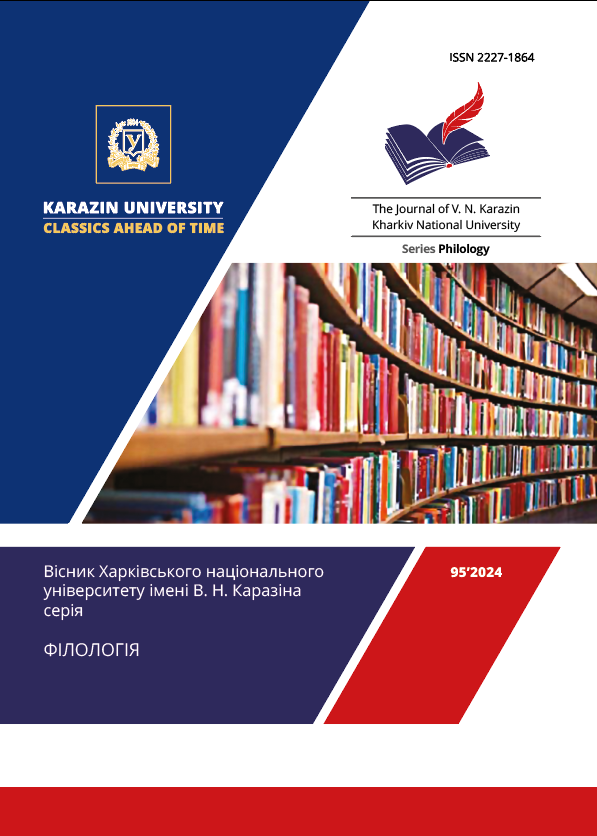A Man “Resembling Sancho Panza”: Viktor Petrov's Self-Presentation in Letters to Sofiia Zerova
Abstract
The original figure of V. Petrov (1894–1969) is still in the halo of mystery and unsolved. This is due to his remarkable personality and the scarcity of self-representative texts, including letters, available in the public domain.
The purpose of the study is to try to identify V. Petrov's ways of self-presentation in letters to S. Zerova and analyse various strategies for forming one's image for the needs of the addressee, the Other (partner in the epistolary dialogue).
It has been found that, unlike the epistolary of other writers, these letters do not reflect the historical and literary processes of their time or problems related to artistic creativity. The dominant themes in the correspondence are those of daily life and everyday life. It is through the prism of this topic that the addressee's personality expresses itself, his self-presentation as a man in love who is concerned with the daily troubles of a person dear to him. In his letters, Petrov is caring and persistent, romantic and self-ironic at the same time. For the addresser and addressee, who had not seen each other for months, letters were the only communication channel. The epistolary monologues of the letter writer reflect how he creates the effect of being present in the life of his beloved.
It is shown that self-presentation highlights the image of the addresser within the shifting chronotopic framework of the day, revealing their unique character, and emotional state in a given context, and capturing impressions of recent events, facts, or phenomena. Everyday life and longing for his beloved become the basis for imagery and sensuality.
It is proved that the "I" image presented by V. Petrov in his letters to S. Zerova reveals the inner world of the writer most deeply and unexpectedly and reflects different ways of conceptualizing himself. One of them is the image of a man who resembles Sancho Panza, hiding his romantic feelings under a purely prosaic shell.
Downloads
References
Autobiography of Petrov Victor Platonovych (2002). Introduction and notes by V. Korpusova. Word and Time, 10, 51–52. [in Ukrainian].
Andreev, V. (2017). From the family of priests: Viktor Petrov's childhood and youth. Scriptorium nostrum, 1 (7), 7–37. [in Ukrainian].
Bryukhovetskyi, V. (2013). Viktor Petrov: peaks of destiny – on top and on the floor. Kyiv: Tempora. 168 p. [in Ukrainian].
Bryukhovetskyi, V. (2011). A Day that can contain eternity. Horizons of personality: A book in honor of Ivan Dzyuba. Kyiv: Duh i litera, 185–205. [in Ukrainian].
Bryukhovetskyi, V. (2020). Fabler-mystifier «Pavlo Krechet». Viktor Petrov: mapping the writer's creativity. Krakow: Universitas, 43–71. Retrieved from https://ekmair.ukma.edu.ua/handle/123456789/20337. [in Ukrainian].
Publishing house «Vivat». (2024). Retrieved from https://www.facebook.com/story.php?story_fbid=568850912468366&id=100080303855994&rdid=BhuCLVMfPhs1senw. [in Ukrainian].
Domontovych, V. (2015). Bolotyana Lukroz. Kyiv neoclassics. Kyiv: Smoloskyp, 459–499. [in Ukrainian].
Domontovych, V. (2012). A lonely traveler walks along a lonely road [Romanized biographies. Short story, novel]. Kyiv: Spadshchyna. 380 р. Retrieved from https://chtyvo.org.ua/authors/Petrov/Samotnii_mandrivnyk_prostuie_po_samotnii_dorozi/ [in Ukrainian].
Zabolotna, T. (2005). The epistolary heritage of V. Vynnychenko: addressing and style: Diss... candidate. philol. Sciences: 10.01.01 / Kyiv. national Taras Shevchenko University. Kyiv. 189 p. [in Ukrainian].
Ilkiv, A. (2016). Intimate discourse of the writer's epistolary of the second half of the 19th – beginning of the 20th centuries: monograph. Ivano-Frankivsk: Foliant. 372 p. [in Ukrainian].
Korpusova, V. (2008). From the last biography of Viktor Platonovych Petrov (Domontovych): «he was a man of calling, not recognition». Ukrainian biography: collection of science works. Kyiv. Vol. 4, 340–365. [in Ukrainian].
Korpusova, V. M. (2023). The phenomenon of V. P. Petrov: creativity and fate. Archaeology and Early History of Ukraine, 49 (4), 71–93. Retrieved from https://adiu.com.ua/index.php/journal/article/view/594. [in Ukrainian]. DOI: 10.37445/adiu.2023.04.05
Kotsyubynska, M. (2009). Letters and people: reflections on epistolary creativity. Kyiv: Duh i litera. 584 p. [in Ukrainian].
Lopushan T., Zarudniak N. (2024). Another mystification of Viktor Petrov (V. Domontovych): Uman episode of the biography of the scientist and writer. Southern archive (philological sciences), 97, 20–30. DOI:10.32999/ksu2663-2691/2024-97-2. [in Ukrainian].
Mazokha, G. S. (2022). Epistolary of artists of the diaspora as a realization of their worldview and aesthetic positions. Transcarpathian Philological Studies. Uzhhorod: "Helvetyka" Publishing House, 2, 21, 202–207. [in Ukrainian].
Online exhibition for the 130th anniversary of the birth of the Ukrainian writer and scientist Viktor Petrov (1894–1969). (2024). Central State Archive-Museum of Literature and Art of Ukraine. Retrieved from https://csamm.archives.gov.ua/2024/10/08/vystavkovyj/ [in Ukrainian].
Petrov, V. (2021). Letters to Sofia Zerova / emphasis. V. Sergienko; the author preface A. Portnov. Kyiv: Duh i Litera. 432 p. [in Ukrainian].
Seven faces of Viktor Petrov: an exhibition. (11.10.2024–11.04.2025). National Museum of the History of Ukraine. Retrieved from URL:https://nmiu.org/events/exhibitions/254. [in Ukrainian].
Ushnevych, S. (2018). Intellectual and psychological prose of Viktor Domontovych: text and context: monograph. Ivano-Frankivsk: NAIR. 216 p. [in Ukrainian].
Shevelyov, Yu. (Yurii Sherekh). (2021). I — me — to me… (and around). Memoirs. II. In Europe: Meetings with Roman Jacobson. Kharkiv : Publisher Oleksandr Savchuk, 896 p., 316 ill. [in Ukrainian].
Shelukhin, V. (2022). Letters to Sofia Zerova. Criticism, 7–8. Retrieved from https://krytyka.com/ua/reviews/lysty-do-sofii-zerovoi. [in Ukrainian].
Sherekh, Yu. (1993). Kulish letters and Kulish in letters. The third guard: Lit. art, ideologies. K.: Dnipro, 48–96. [in Ukrainian].
Cherkashyna, T. (2016). Genres of prose self-representation. Philological discourse, 3, 203–212. [in Ukrainian].
Całek, A. (2019) The New theory of the letter. Krakоw: Księgarnia Akademicka, 452 pp. [in Polish].
Goffman, E. (2008). Man in the Theatre of Everyday Life. Warszawa, 284 pp. [in Polish].




